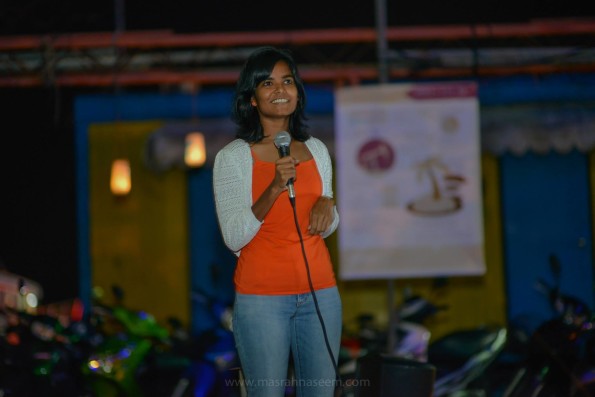This article by the Climate Integrity Project (CIP) team was originally published in the Transparency Review, Issue 1, November 2016 by the Project Human Rights of Transparency Maldives.
________________________________________________

Aisha Niyaz at the Global Divestment Day Maldives event by Ecocare in 2015.
Photo by: Masrah Naseem
Maldives, known as the poster child for climate change by the international community, unfortunately do not seem to show the same level of urgency on climate change issues within its borders. is lack of urgency can be accounted for by the politicisation of the issue nationally, across political factions, making it difficult for young advocates and activists to carve out a role in addressing climate change issues in the country.
Aisha Niyaz, one amongst the handful of Maldivian advocates fighting the climate change issues on the ground, shared with us her experience in engaging in climate change work both at the grassroots and policy level. Aisha has been advocating within the country and abroad for inclusive climate policy-making, and continues to play a pivotal role in getting young people engaged in climate change.
In 2011, Aisha was selected to represent the Global South youth through YOUNGOs (youth constituency under UNFCCC) with funding from the Norwegian Government and hence managed to secure a spot in the official Maldivian government delegation to the UNFCCC COP17 in Durban, South Africa. e experience gave
her exposure on how climate change negotiations take place globally and allowed her to play a role in advocating for youth participation in addressing climate change. Due to Aisha’s technical background and experience in the eld, the head of the delegation (then Minister of Environment) allowed Aisha to speak at the closed-door negotiations and
make contributions, which concluded that funds and programs need to be speci cally allocated for building capacity of young people to address climate change. For young climate change advocates around the world this was a massive win, as in the nal document of that years round of negotiations, building capacity of youth was speci ed in writing.
Locally Aisha has worked to get young people engaged in the climate change arena with initiatives like Maldivian Youth Climate Network and Sai Level Change, and other such efforts. Aisha still continues to share knowledge and build capacity of local communities, particularly young people to address climate change. However, it has not been easy for activists and advocates such as Aisha to in uence climate change policy at the government level in the Maldives.
“Withholding of information by the authorities/government has been one of the major challenges and barriers,” explains Aisha. There is a lack of communication between government institutions and civil society engaged in the eld of climate change. is is fuelled by an atmosphere of mistrust where some institutions feel that civil society is nothing but critical of institutions and their work.
Article 6 of the United Nations Framework Convention on Climate Change (UNFCCC) clearly states
that the public should be meaningfully involved in ‘the solution’. However “civil society is only treated as a stakeholder whenever government institutions see t and is only allowed a place, when instead they should be allowed to be meaningfully involved in decision- making,” states Aisha.
“Since the change of government in 2012 post Durban COP, I feel that the climate change department has pushed me away,” says Aisha. “ ere is no technical grounding for pushing away people like me, since I had been involved in policy development up until that point, including the development of the National Environment Action Plan 2009-2013 and formulation of the carbon neutral master plan, to name a few.”
Aisha’s recent experience in working with the community of G.Dh. Fiyoaree to preserve the art of making thundukunaa (traditional mat weaving unique to Huvadhoo Atoll) is a good example of how climate change continues to impact the traditional way of life of people as the local natural materials needed to make these mats are increasingly di cult to obtain due to the impact of climate change on the livelihood.
According to Aisha, similar to many island communities across the country, there seems to be lack of trust by the local community towards their local government in Fiyoaree as well and a lot needs to be done to create dialogue between communities and government institutions that seek to address the climate change concerns of the people.
For climate change advocates, such as Aisha to contribute to climate finance governance, there needs to be more concerted effort on the part of government stakeholders to create space for citizens to engage in the governance of climate change projects. Similarly, more people should become aware of their rights and that the mismanagement of climate nance or climate change projects ultimately has an impact on their lives.
